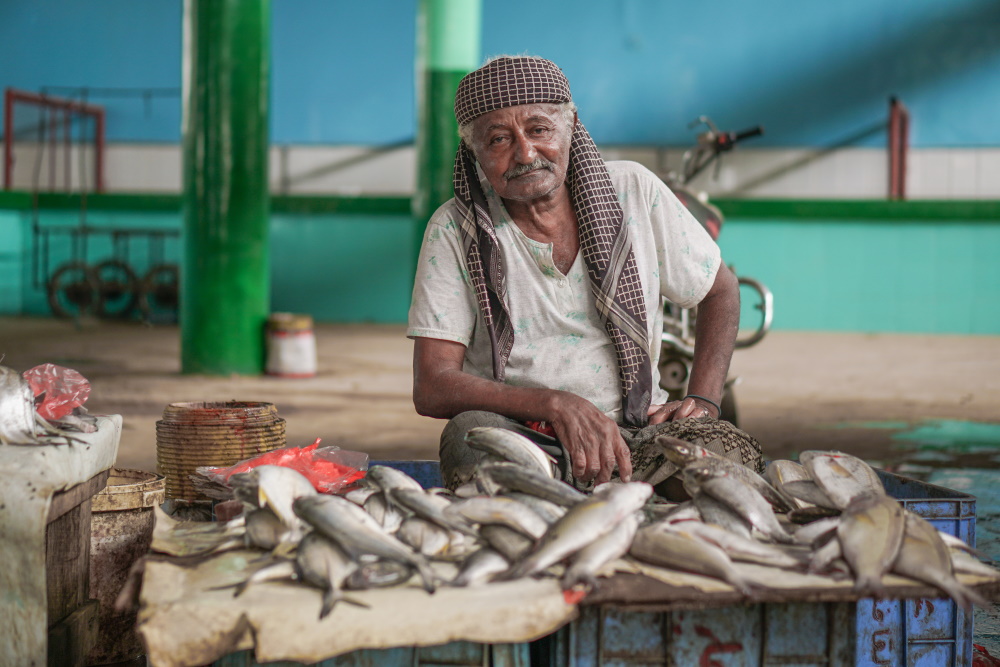An old man opened his business in Ja'ar Local Market | Photo Credit: UNDP Yemen
With clogged sewers and a severe water shortage, the Ja’ar central market was forced to close its doors. Unsafe for its produce farmers and butchers to operate, the residents in the capital of Khanfar District had no local marketplace to buy their goods, and local merchants no place to earn cash for their crops.
Home to more than 70,000 people, Ja’ar is one of the largest settlements in the in southwestern Abyan Governorate. Before the conflict erupted in 2015, the central marketplace was a bustling public exchange, but in 2016 the doors closed. As the conflict continued, the problems worsened as the cost and time to fix them increased.
Forced to sell their produce on the street, the town faced serious traffic issues as the paths intended for pedestrians became overcrowded with carts and tables. “Sellers are on both sides of the street, creating traffic jams and affecting the movement of people,” Naser Almansari, the Khanfar District Director explains. “Sellers dispose of waste in the street; it’s not a healthy practice. Even worse, the fish and vegetables are exposed to dust and flies.” The need to fix the marketplace was becoming more critical to return order and cleanliness to Ja’ar.
As time passed, the market’s dilapidated space – now used routinely for garbage disposal – began spilling into the streets and concern of a disease outbreak increased. With no alternate market within close distance, UNDP Yemen’s Supporting Resilient Livelihoods and Food Security in Yemen Joint Programme (ERRYJP II), employed people from the local community to restore the building to its former glory.
This meant that 150 Yemenis (including 23 women) were also able to earn an immediate income through cash-for-work, completing the cleaning, electrical work, painting and sewage repairs that were critical to the markets re-opening. In total, 20 tons of waste were removed, and with a fresh coat of paint, energy was returned to a previously dank space.
Ja’ar Central Market before and after rehabilitation, and after the re-opening of the market | Photo Credit: UNDP Yemen/ERRY JP
Today merchants are celebrating increased sales – sometimes up to 30% per day – as a result of the clean new market. “I am happy to sell my fish in the market. I used to sell 10 per day, but now I sell between 14 – 15," exclaims Mohsen, a fish merchant working in the Ja’ar central market.
Mohsen has increased his daily profits thanks to the rehabilitation of the market | Photo Credit: UNDP Yemen/ERRYJP
With increasing demand for more stalls, the local authorities are also drawing up plans for further development of the space.
“We are thankful for the rehabilitation of our local market. Now the people don’t have to suffer and the food they buy is cleaner and more hygienic. Since the rehabilitation, we have managed to bring back wholesalers to the market and we will continue to do so,” says Almansari.
***
These activities were implemented as a part of the Supporting Resilient Livelihoods and Food Security in Yemen Joint Programme (ERRYJP II) in partnership with Oxfam. The Programme aims to strengthen the resilience capacity of crisis-affected communities through the creation of sustainable livelihoods and access to basic services. The joint programme implements labor-intensive emergency employment activities – or cash-for-work – that enables the rehabilitation of community assets. With renewed access to livelihood opportunities for conflict-affected Yemenis, Internally Displaced Persons (IDPs), and the marginalized, they have improved purchasing power and can now buy food and essentials while contributing to the local economy.

 Locations
Locations



